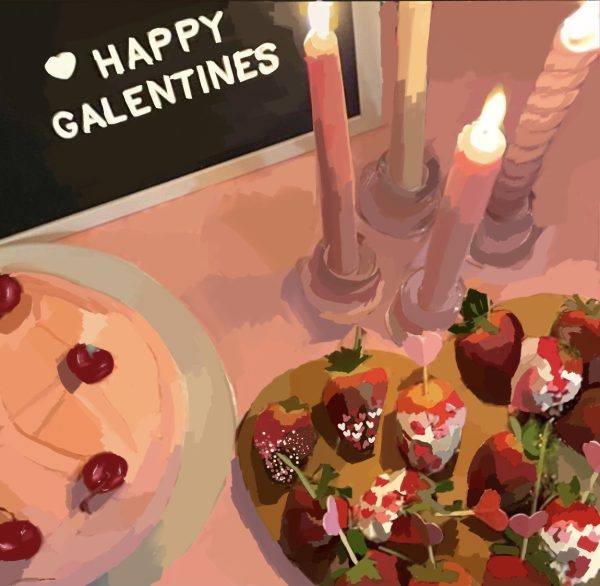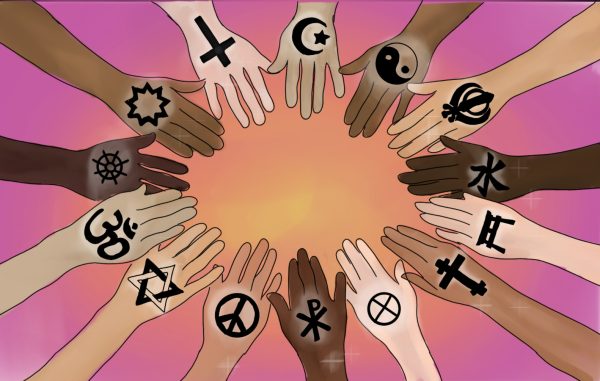Conversation with a Hindu
August 24, 2022
In a couple of sentences, can you tell me what you believe?
So, I am a Hindu. I believe that there is a God and that they manifest in many different forms, and you can believe in whatever form of God you want. I also believe in karma. So, I believe that good things come to the people who do good and bad things will come to the people who do bad.
So, Shreya, I myself don’t know a whole lot about Hinduism, and I’m sure some of our other We Are readers don’t as well, so would you be able to expand on Hinduism for me?
Hinduism is one of the world’s oldest religions, and, as much as it is a religion, it is more like a way of life. We believe that the gods are the truth and there are many different gods, but they are all almost the same, they just manifest in different forms. Within Hinduism itself, there’s so many different practices and ways to believe, ways to pray, it’s really freeing; you have a lot of freedom to choose what you want to believe in, how you want to pray, what God do you want to believe, but essentially, it’s all under one big umbrella. Really the topic of karma covers it well: that good things will come to those who will do good and bad things will be coming to you if you do bad.
Does your family share the same beliefs as you and how has this impacted your faith?
Yes, my family does share the same beliefs as me, and I did grow up in like a Hindu household. It’s definitely taught me Hinduism from a very young age, but I did also come to Christian school in Year 5, and those are really your formative years when you learn a lot about yourself, and you get to make your own choices. I definitely had a choice and I openly listened about Christianity, questioning my teachers, and when I’m questioning about Hinduism I always go to my dad, because he’s the one who teaches us [Shreya and her siblings]. I questioned him because I didn’t want to blindly believe so I made a choice in believing Hinduism because that’s just what I thought resonated with me the most. But that doesn’t mean that choice is permanent; it’s just what I think feels right and what I believe in for now.
Can you expand a little bit more on what it’s been like being someone that’s not Christian at a Christian school?
It’s definitely been interesting. I’ve gotten multiple points of view and I seem to understand where you’re coming from a lot better, and I think the morals and the way that you should live is really similar in a lot of religions. You can see where it lines up in Hinduism and Christianity, they tell you to be good people and do good things in life. But it also becomes kind of challenging when you’re trying to understand someone’s viewpoint and not judge them, you’re trying to keep an open mind. I’ve liked being at a Christian school, it’s definitely opened my mindset, and I wouldn’t be the same person if I didn’t come to William Clarke.
That’s a very mature, and rounded outlook on it all! Also, you mentioned before that in Hinduism, people can express it quite differently and can practise it quite differently, so I wanted to ask you if you pray and if you do, how why do you pray?
So, I do pray, and I think praying is just another way to get closer to God. In Hinduism you really just pray to whichever God you want to believe in and they are all pretty much the same essence, but the way that you pray, how you pray, whether you go to a temple – and many Hindu families have temples at home – you can pray in the mornings – which is I feel like a common practise – is your own choice. But also, like going to temples on special occasions and praying there or a when you’re in trouble or hardship or when you’re happy, but I do pray and I think it’s really important to pray, which is like seen across most religions – and Christianity does the same. It’s really just another way to connect with God, get some guidance.
Do you have a temple at your home?
Yeah, we have a small temple. I know in Christianity you don’t, but in Hinduism we have statues of our gods, and it’s not that we’re praying to the statues, it’s just to help us pray to the gods and keep them in mind, another way of worship.
Right, so in all of that where do you find your purpose and meaning, where does that stem from for you?
I find my purpose and meaning from within myself, and it obviously comes from my faith and how I want to do good, because I want good things in life, and I want to be closer to God because that is how we live a better life. In almost all the religions it says, ‘be close to God’, ‘do good’, but you really can find your purpose and meaning within yourself, and then you look to your gods for guidance, and you question them, and you question people. But you can choose what your purpose and meaning is, you can choose what you want to do with your life, and I think having that choice gives you ownership of what you want to do and helps you to figure out what is that you are the best in, what feels right.
That’s an interesting perspective, I think. Now I want to ask you, with karma, how do you find keeping that worldview when there’s situations where a ‘good’ person suffers trials, or a ‘bad’ person is rewarded?
Well, flowing from Christianity a little bit, no one is perfect right. You have to do your best to keep your worldviews, and I think in some situations there is no definite good and there’s no definite bad – the lines are blurred – that’s when you look to the gods for the truth. Often the truth helps you lead to the best option possible. This world is not perfect but it’s almost as if heaven and hell both exist on earth, you do good things you get good places, you’ll have a better life – that would be closer to heaven – you do bad things, bad things will come to you – it’ll be closer to hell. Keeping a worldview in different scenarios, you also need to remember that everything is contextual, so as much as you can do your best you also have to admit that some points you’re stuck because we’re humans, we’re not God. Yeah, all you can do is your best.
Yeah, so you mentioned heaven and hell then as well. So, what do you believe about life after death?
So, I do believe there is life beyond death. I’ve heard many different beliefs about reincarnation, and personally what I believe is that when you do really good in life, if you have done enough good, you’d go up and you’d be with God, but if you have not done enough good in a sense or you’ve done more bad than good, then you’d come back on earth and you get a second chance. Or you just keep trying until you’ve done the best that you can, or you’ve tried, because well that’s just what I believe in, I guess.
How does that sit with you knowing it’s like a benchmark, if that makes sense, like you’re trying to reach a goal or is it still freeing because you have those chances to try again?
I think, in a way, it is about all those chances. It doesn’t feel like a benchmark, it’s less of a benchmark, because in our mind you have to do certain actions to be good, but you don’t know what God is judging you by. It’s more about being a good person at heart. No matter how many bad actions you’ve done, if you are good person at heart God will see that. So, it’s less of like, ‘oh I need to keep doing good to achieve this benchmark so I can stop the cycle and go be with God,’ it’s like I need to be a good person from inside and whatever happens, however many mistakes I make, as long as I’m trying to be a good person God will see that. It’s more like trying to be the best you can be and trying to be good but it’s not like, ‘oh no I have to be good otherwise I’m going to fail and go to hell.’
Taking a slight detour, what’s something that you find enjoyable about being Hindu and what’s something that you find difficult about it, especially being in an Australian society?
Well, we have a lot of cultures and customs which I just love being a part of, because it’s so vibrant and because it’s so old it’s gotten so much time to develop. There are so many different ideas and worldviews, because India is huge and has been around for a very long time as a very cultured society, so you can find people who are Hindu and pray to different gods than you do or practice differently or believe in something similar but different. It’s so interesting and you both believe in like the same concepts, but you also believe in different things, and it’s so fun to see that.
Something I find difficult, especially in Australian society, is a lot of the Hindu texts are written in Hindi or in Sanskrit, which is one of the older languages. When it gets translated it is really difficult to read, so I kind of get all my information second hand. I have to read up online and see what other people say, the way they’ve interpreted it, and try to figure out what it actually says. To read it is so difficult (I’ve tried once or twice) but it’s a constant process, trying to read the translated version. So, I’m always questioning, ‘what does this actually say?’ but yeah that’s probably one of the most difficult parts.
Yeah, that does sound difficult. I think sometimes I take for granted, as a Christian, the fact that the Bible has been translated in so many languages over time, that it’s so readily available to us here.
Yeah, I’ve seen in the Bible that it’s explained really well, and the language is obviously important, but it’s also like simple enough to understand. Also, in Australian society you don’t find as many copies of those Hindu books, and when they do arrive the translations are still difficult to understand. It takes a while to process everything.
So, is there anything else that you would like to tell our we are readers before we finish up?
Well, I wanted to say, there’s many different religions and I don’t think any of them are wrong and I respect all of them. Especially Christianity, like all the morals and the values are really really similar to Hinduism, and Christians believe in being good, and doing right, living by the Bible, living a good and kind life, which is very similar to what I believe. You really just need to find what you believe in and know that you’re not trapped. For a while, I felt like I needed to make a decision between Hinduism and Christianity or something else, but you’re not trapped, you can choose what you believe in, and you can learn more about it. If you find that you are confused about something, you need to find people that you can question and learn more about it from, and if you don’t know what to believe in then that’s also okay.
I agree that finding the truth can be quite freeing, especially perhaps from that feeling of being trapped. Thank you so much Shreya for having the courage and vulnerability to share about your faith. Thank you!













